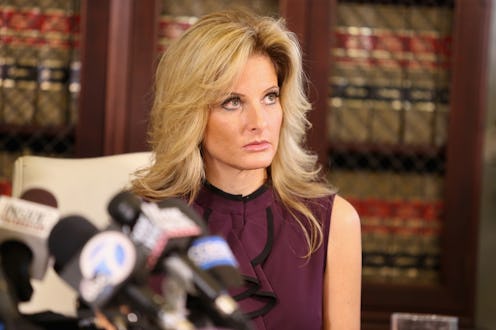News
This Update On Summer Zervos' Lawsuit Means Big Things Could Be Coming For Trump

A New York Supreme Court judge ruled Tuesday that, despite being a sitting president, Donald Trump can be deposed in Summer Zervos' defamation lawsuit against him. Judge Jennifer Schecter set a timeline for both sides to issue and complete discovery demands, submit subpoenas, and conduct depositions — all of which must be completed by April 2019.
Zervos, a former contestant on The Apprentice, is one of more than a dozen women who have come forward with allegations of sexual harassment or sexual assault against Trump, all of which he denies. When she first made her allegations public during the run-up to the election, that Trump had forcibly kissed and groped her, the Trump campaign issued a statement calling the claims "false and ridiculous" and accusing Zervos of looking for fame or money. In November 2016, Zervos called upon Trump to retract his statements — he declined to do so.
Her lawsuit, filed in January, 2017, just days before Trump's inauguration, claims that he defamed her with his statements. When she initially announced the lawsuit, she added:
I want Mr. Trump to know that I would still be willing to dismiss my case against him immediately for no monetary compensation if he will simply retract his false and defamatory statements about me and acknowledge that I told the truth about him.
This decision follows a March 20 ruling, in which Schecter dismissed Trump's claim that he could not be sued as a sitting president, since the alleged defamation had occurred before he assumed office.
“In Clinton v Jones the United States Supreme Court held that a sitting president is not immune from being sued in federal court for unofficial acts,” she added, citing Paula Jones' 1994 lawsuit against Bill Clinton for sexual harassment.
Trump appealed to Manhattan Supreme Court, asking to halt the defamation case, and was denied on May 17. He then submitted a second appeal to the New York Court of Appeals, and is now awaiting a response. According to Politico, Trump's attorney, Marc Kasowitz, describes the debate over whether or not a sitting president can be sued as a "critical constitutional issue" that should be resolved by the Supreme Court before the case proceeds.
Zervos' lawyer Mariann Wang has called this response merely a stall for time, Politico reported. Wang and her legal team already issued a subpoena in 2017 to the Trump campaign for all documents relating to Zervos' and other women's allegations of sexual assault and harassment against Trump — at the time, the Trump campaign refused to comply, and Kasowitz called the information "irrelevant." As part of her decision on Tuesday, Schecter ordered both sides to provide her briefings on the issue.
Kasowitz also said his team would do its best to adhere to the Schecter's timeline, but that given the "significant attendant duties" of the president, they may need to ask for adjournments.
Despite Schecter's decision that the Zervos case will continue, recent statements made by Trump and his lawyer, Rudy Guiliani, about the president's pardon power throw the proceedings into a new light. Though legal experts and politicians continue to push back, over the last few days Trump has repeatedly claimed he has the right to pardon himself in the Russia probe, even though he says he's "done nothing wrong".
Should proceedings with Zervos' case — or with a number of other current lawsuits, including adult film actress Stephanie Clifford's suit for damages over a faulty NDA — escalate to a conviction, it is possible the scope of the issue might expand to presidential constitutional rights.